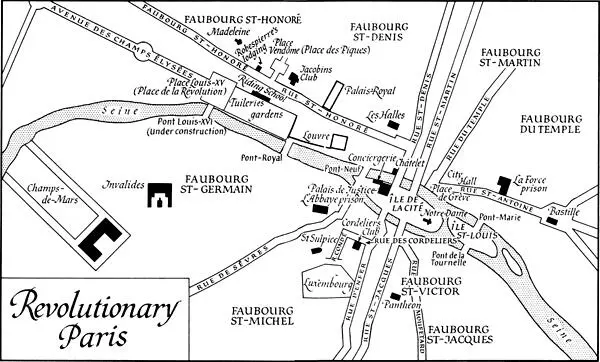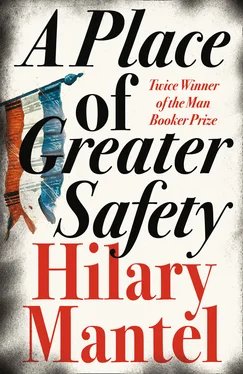Eléonore, an art student, his eldest daughter
Victoire, his daughter
Elisabeth (Babette), his youngest daughter
Charles Dumouriez, a general, sometime Foreign Minister
Antoine Fouquier-Tinville, a lawyer; Camille Desmoulins’s cousin
Jeanette, the Desmoulins’s servant
PART V
Politicians described as ‘Brissotins’ or ‘Girondins’:
Jean-Pierre Brissot, a journalist
Jean-Marie and Manon Roland
Pierre Vergniaud, member of the National Convention, famous as an orator
Jérôme Pétion
François-Léonard Buzot
Jean-Baptiste Louvet
Charles Barbaroux, a lawyer from Marseille and many others
Albertine Marat, Marat’s sister
Simone Evrard, Marat’s common-law wife
Defermon, a deputy, sometime President of the National Convention
Jean-François Lacroix, a moderate deputy: goes ‘on mission’ to Belgium with Danton in 1792 and 1793
David, a painter
Charlotte Corday, an assassin
Claude Dupin, a young bureaucrat who proposes marriage to Louise Gély, Danton’s neighbour
Souberbielle, Robespierre’s doctor
Renaudin, a violin-maker, prone to violence
Father Kéravenen, an outlaw priest
Chauveau-Lagarde, a lawyer: defence council for Marie-Antoinette
Philippe Lebas, a left-wing deputy: later a member of the Committee of General Security, or Police Committee; marries Babette Duplay
Vadier, known as ‘the Inquisitor’, a member of the Police Committee
Implicated in the East India Company fraud:
Chabot, a deputy, ex-Capuchin friar
Julien, a deputy, former Protestant pastor
Proli, secretary to Hérault de Séchelles, and said to be an Austrian spy
Emmanuel Dobruska and Siegmund Gotleb, known as Emmanuel and Junius Frei: speculators
Guzman, a minor politician, Spanish-born
Diedrichsen, a Danish ‘businessman’
Abbé d’Espanac, a crooked army contractor
Basire and Delaunay, deputies
Citizen de Sade, a writer, formerly a marquis
Pierre Philippeaux, a deputy: writes a pamphlet against the government during the Terror
Some members of the Committee of Public Safety:
Saint-André
Barère
Couthon, a paraplegic, a friend of Robespierre
Robert Lindet, a lawyer from Normandy, a friend of Danton
Etienne Panis, a left-wing deputy, a friend of Danton
At the trial of the Dantonists:
Hermann (once of Arras), President of the Revolutionary
Tribunal
Dumas, his deputy
Fouquier-Tinville, now Public Prosecutor
Fleuriot and Liendon, prosecution lawyers
Fabricius Pâris, Clerk of the Court
Laflotte, a prison informer
Henri Sanson, public executioner
Map of Revolutionary Paris

LOUIS XV is named the Well-Beloved. Ten years pass. The same people believe the Well-Beloved takes baths of human blood … Avoiding Paris, ever shut up at Versailles, he finds even there too many people, too much daylight. He wants a shadowy retreat …
In a year of scarcity (they were not uncommon then) he was hunting as usual in the Forest of Sénart. He met a peasant carrying a bier and inquired, ‘Whither he was conveying it?’ ‘To such a place.’ ‘For a man or a woman?’ ‘A man.’ ‘What did he die of?’ ‘Hunger.’
Jules Michelet
I. Life as a Battlefield
(1763–1774)
NOW THAT THE DUST has settled, we can begin to look at our situation. Now that the last red tile has been laid on the roof of the New House, now that the marriage contract is four years old. The town smells of summer; not very pleasant, that is, but the same as last year, the same as the years to follow. The New House smells of resin and wax polish; it has the sulphurous odour of family quarrels brewing.
Maître Desmoulins’s study is across the courtyard, in the Old House that fronts the street. If you stand in the Place des Armes and look up at the narrow white façade, you can often see him lurking behind the shutters on the first floor. He seems to stare down into the street; but he is miles away, observers say. This is true, and his location is very precise. Mentally, he is back in Paris.
Physically, at this moment, he is on his way upstairs. His three-year-old son is following him. As he expects the child to be under his feet for the next twenty years, it does not profit him to complain about this. Afternoon heat lies over the streets. The babies, Henriette and Elisabeth, are asleep in their cribs. Madeleine is insulting the laundry girl with a fluency and venom that belie her gravid state, her genteel education. He closes the door on them.
As soon as he sits down at his desk, a stray Paris thought slides around his mind. This happens often. He indulges himself a little: places himself on the steps of the Châtelet court with a hard-wrung acquittal and a knot of congratulatory colleagues. He gives his colleagues names and faces. Where is Perrin this afternoon? And Vinot? Now he goes up twice a year, and Vinot – who used to discuss his Life Plan with him when they were students – had walked right past him in the Place Dauphine, not knowing him at all.
That was last year, and now it is August, in the year of Grace 1763. It is Guise, Picardy; he is thirty-three years old, husband, father, advocate, town councillor, official of the bailiwick, a man with a large bill for a new roof.
He takes out his account books. It is only two months ago that Madeleine’s family came up with the final instalment of the dowry. They pretended – knowing that he could hardly disabuse them – that it was a kind of flattering oversight; that a man in his position, with steady work coming in, would hardly notice the last few hundred.
This was a typical de Viefville trick, and he could do nothing about it. They hammered him to the family mast while, quivering with embarrassment, he handed them the nails. He’d come home from Paris at their behest, to set things up for Madeleine. He hadn’t known that she’d be turned thirty before her family considered his situation even half-way satisfactory.
What de Viefvilles do, they run things: small towns, large legal practices. There are cousins all over the Laon district, all over Picardy: a bunch of nerveless crooks, always talking. One de Viefville is Mayor of Guise, another is a member of that august judicial body, the Parlement of Paris. De Viefvilles generally marry Godards; Madeleine is a Godard, on her father’s side. The Godards’ name lacks the coveted particle of nobility; for all that, they tend to get on in life, and when you attend in Guise and environs a musical evening or a funeral or a Bar Association dinner, there is always one present to whom you can genuflect.
The ladies of the family believe in annual production, and Madeleine’s late start hardly deters her. Hence the New House.
This child was his eldest, who now crossed the room and scrambled into the window-seat. His first reaction, when the newborn was presented: this is not mine. The explanation came at the christening, from the grinning uncles and cradle-witch aunts: aren’t you a little Godard then, isn’t he a little Godard to his fingertips? Three wishes, Jean-Nicolas thought sourly: become an alderman, marry your cousin, prosper like a pig in clover.
The child had a whole string of names, because the godparents could not agree. Jean-Nicolas spoke up with his own preference, whereupon the family united: you can call him Lucien if you like, but We shall call him Camille.
Читать дальше













